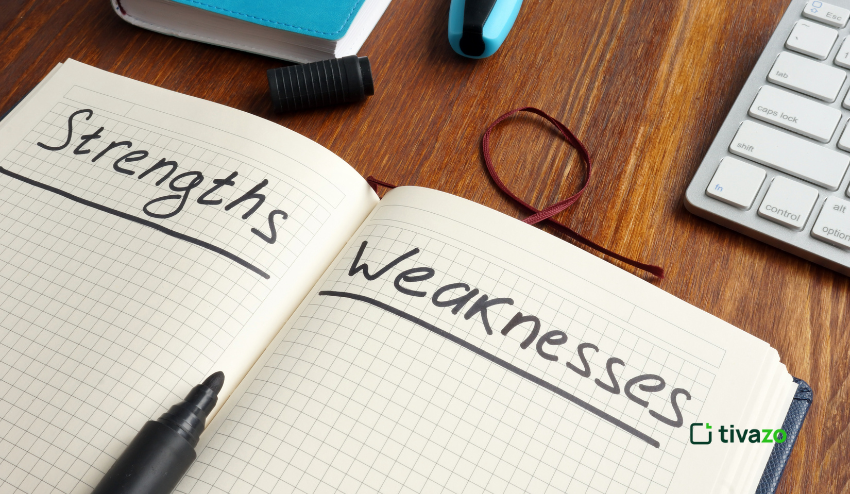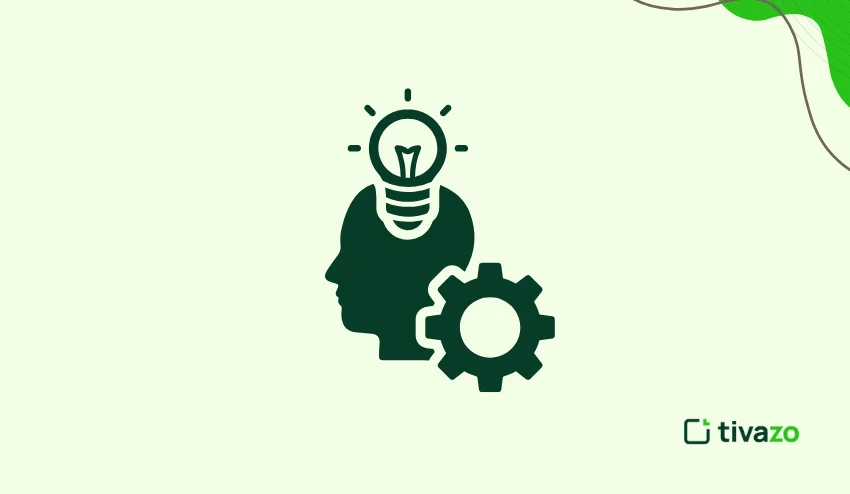Whether you’re looking for a job, trying to get a promotion, or managing a team, knowing your work strengths is vital to your success. But work strengths are more than just saying you’re a “team player” or a “problem solver.” Working knowledge of your work strengths means knowing what makes you different, what value you deliver, and how to express it with confidence.
Are you here to get better answers for your interviews, help your team excel, or just want greater clarity on your capacity? This guide includes lots of useful, actionable information you can apply to make sure you stand out and succeed.
Key Highlights:
- What Is a Work Strength?
- Important Work Strengths to Have
- Work Strengths Examples
- Exist a Strengths – Weaknesses Table
- Strategies for Talking about Strengths
- What are 5 strengths a person could possess?
- 5 Examples of Strengths and Weaknesses?
- Ways to Identify and Use Work Strengths
What Is a Work Strength?
A work strength is a skill, ability, or characteristic, either a soft skill like communication or adaptability or a hard skill like Excel or coding, that enables you to perform exceptionally well at work. Knowing your work strengths allows you to promote your strengths in interviews, plan career development, and maximize your effectiveness.
Identifying your strengths also builds self-confidence and helps to shape your position to include tasks that make you feel energized, ultimately improving job satisfaction and efficiency. For employers and team leaders, knowing the strengths of an individual employee helps to create better task assignments, improve collaboration, and contribute to business success.
Important Work Strengths to Have
The following are the top most effective work strengths and universally valued in every industry:
The 10 Best Work Strengths of a Worker
| Rank | Work Strength | Description |
| 1 | Communication | Clear writing and speaking |
| 2 | Teamwork | Collaborating effectively with others |
| 3 | Problem-solving | Ability to think analytically and be solution-focused |
| 4 | Adaptability | Ability to be flexible while changing |
| 5 | Leadership | Ability to inspire and lead others |
| 6 | Time management | Ability to meet deadlines |
| 7 | Technical competence | Specific hard skills for a particular industry |
| 8 | Creativity Ability | To demonstrate innovative thinking |
| 9 | Emotional intelligence | Ability to be self-aware and empathize with others |
| 10 | Reliability and dependability | Consistent work performance |
All of these characteristics meet the expectations of the company. They may identify strong individual performance.
Work Strengths Examples
Knowing how to talk about your work strengths is a valuable skill, especially when preparing your résumé, writing your self-review, or fielding challenging interview questions. Below are actual examples of work strengths that not only reveal what they happen to be, but also how to speak about them with purpose.
3 Examples of Work Strengths You May Share
By mentioning a work strength, it is important to couple each strength with an actual example or scenario. A concrete example or scenario adds credibility and helps the employer imagine how you leverage your strengths in real-world scenarios.
Analytical
“I review customer metrics every week and use this data to improve our products.”
This example reflects your ability to synthesize and leverage data towards actionable insights. This is a highly sought-after strength for roles that involve strategy, marketing, product management, or operations. Using the best product management tools can further enhance your ability to track metrics, prioritize tasks, and make data-driven decisions effectively.
Collaborative
“I led cross-functional meetings focused on aligning our deployment strategy.”
This example demonstrates your ability to lead and work with a team across departments—an essential strength today given that work happens more and more in collaborative environments.
Resilient
“I was able to maintain performance as deadlines were compressed.”
This example aspirationally describes your emotional strength and persistence, ability to concentrate under pressure, and determination—critical in fast-paced or high-stakes roles.
“What Are Your 3 Strengths?”
This is one of the most frequently asked questions during job interviews—and it may be your best opportunity to demonstrate your primary work strengths. A strong answer will offer three strengths that apply to the role and include examples of each.
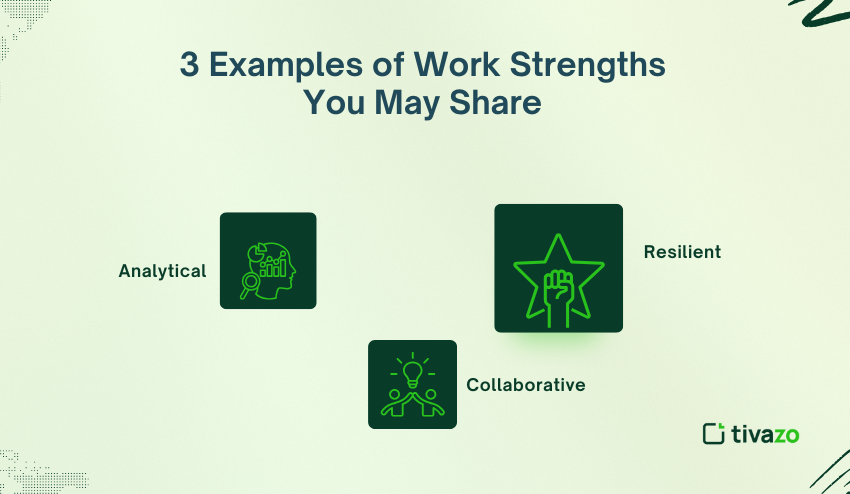
Here’s an example of a good answer
“My three strongest work strengths are communication, problem-solving, and adaptability.”
I have always prided myself on my communication skills. I actively listen to what others say, whether they are my internal team or external clients, ask thoughtful questions, and ensure both parties have an accurate understanding of the conversation.
A second strength I possess is problem-solving. I successfully created a reporting system at my last role that reduced operational time delays by 25%. I enjoy finding problems and sources of friction, and then developing a solution to eliminate the issues and improve the workflow.
Lastly, adaptability is a strength that I have also utilized throughout my career. When my team moved to a remote model, I adapted my workflow processes quickly and also helped others adapt and onboard with new tools that were meant to support them if they were to maintain productivity.
Exist a Strengths – Weaknesses Table
| Strengths | Weaknesses (along with growth plan) |
| Communication | Public speaking anxiety → practice + feedback |
| Teamwork | Assertiveness → training in negotiation |
| Time management | Overcommitting → planning by priorities |
| Technical knowledge | Unfamiliarity with the new tool → available online course |
| Leadership | Difficulty delegating → mentorship |
Strategies for Talking about Strengths
When you are asked questions like “What are your strengths?” “What are your work strengths?” — no matter the context (interview, performance appraisal, development conversation), your response really should be structured and compelling. Here is a proven strategy:
1. Assess the job description or the team’s needs
Focus on a solid understand of what the company or team is seeking. Emphasize your strengths that closely align with their needs.
2. Choose 2-3 relevant work strengths aligned to the position
Pick strengths that are true to you but also actually contribute to your fit for the specific role or project.
3. Tell a short story/example about how you used that strength
Employ the STAR format: situation, task, action, results. Use this situation to build a compelling and impactful story.
4. Quantify results if possible
Numbers are always better than words. Say “15% increase in deployed customer retention” versus “reduced customer retention.”
5. Show how you will employ it forward
Tie it back to the company, or how it will aid the team. This shows future orientation.
For managers: It can be a helpful exercise to assist your team in identifying strategies for doing their best work through surveys, peer feedback, and self-reflection tools, such as a self-portrait exercise. Once employees identify their strengths, assign project roles and responsibilities connected to their strengths in order to enhance engagement, productivity, and teamwork. Also, come back to strengths during performance check-ins, as it is important to nurture and maximize their strength. A strength-based strategy will increase morale and collaboration and will enhance output from others in different departments.
What are 5 strengths a person could possess?
- Empathy – Understanding colleague’s needs
- Organization – Ability to map out clear tasks
- Curiosity – Wanting to learn and grow
- Accountability – Owning the outcomes
- Creativity – Generating new ideas
Use these as strengths at work for interviews or performance reviews.
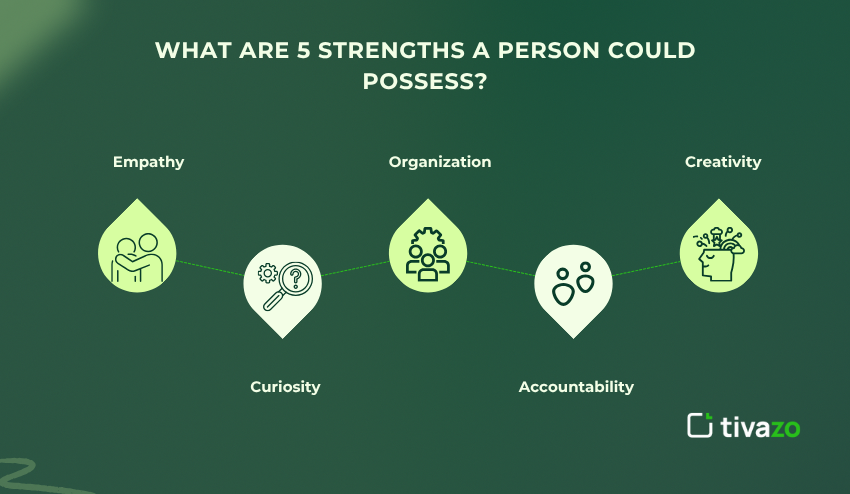
5 Examples of Strengths and Weaknesses?
When asked about your strengths and weaknesses in an interview or performance review, the interviewer intends to assess your self-awareness, honesty, and commitment to growth. As noted earlier in this guide, I would advise you to focus on work-related strengths such as communication, trustworthiness/reliability, problem-solving, adaptability, and technical capabilities. All are considered strengths, and they all demonstrate your ability to implement meaningful contributions to a team or organization.
Five work strengths to share with confidence:
- Communication – Both verbal and written communication is clear and persuasive.
- Reliability – Often follows through and delivers on time.
- Problem-solving – Solution-oriented and able to draw logical conclusions while exhibiting creativity.
- Adaptability – Thrives in a changing environment.
- Technical skills – Comfort and proficiency in common tools or systems within your industry.
Five Examples of Common Weaknesses
- Public Speaking – Taking courses and practicing regularly to overcome self-consciousness.
- Perfectionism – Learning to balance and communicate quality and efficiency.
- Delegation – Trust and clearer expectations
- Time management – Using task management software, such as Trello or Notion
- Procrastination – Breaking tasks up so that they become smaller, manageable pieces.
Presenting weaknesses as areas of development with visible action items shows a growth mindset, something that employers really value. Always customize your responses to the role and be genuine.
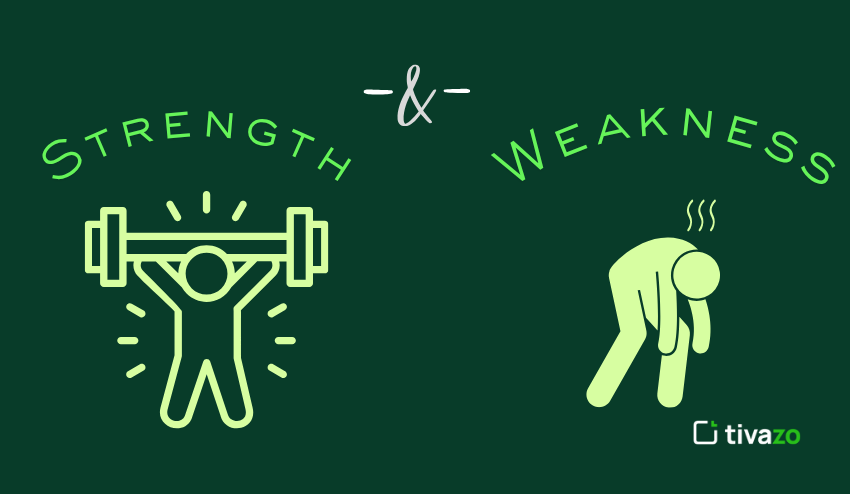
Ways to Identify and Use Work Strengths
For Individuals & Job Seekers
- Identify your top work strengths through self-reflection, feedback from peers, and managers.
- Articulate them in resumes and interviews.
- Develop stories around each: situation, action, result.
For Team Leaders and Coaches
- Survey team members about the tasks that “energize” them to identify their work strengths.
- Create development plans through identified strengths to leverage aligned goals.
- Leverage strengths to assign roles, provide mentoring and succession planning, and promote engagement.
- Prepare managers to speak about strengths using templates.
Top 10 Attributes of a Worker
Here is a quick summary of the most recognized work attributes that contribute to individual and team effectiveness:
Leadership
Ability to inspire, manage, and motivate others for results while being accountable.
Communication
Ability to share information accurately and effectively (i.e., Verbal and Written).
Teamwork
Willingness to collaborate and support other workers for a common goal.
Problem-Solving
Ability to analyze and think critically through situations and provide smart solutions quickly.
Adaptability
Ability to adapt to a new environment, tool, challenge, or action without impairment.
Reliability
Exceptionally dependable worker, consistently meeting deadlines, following through, and providing quality of work.
Technical Skill
Strong working knowledge of the tools, platforms, or software applied in the role or the industry.
Time Management
Ability to prioritize and avoid procrastination while meeting deadlines.
Creativity
Ability to create new ideas, approach problems creatively, and improve methods and practices.
Emotional Intelligence
Ability to self-regulate, be aware of one’s own and other people’s emotions, and relate to, interact with, and engage others positively.
All of the above areas of work attributes can be used to establish baselines for hiring, measuring performance, and creating high-performing teams.
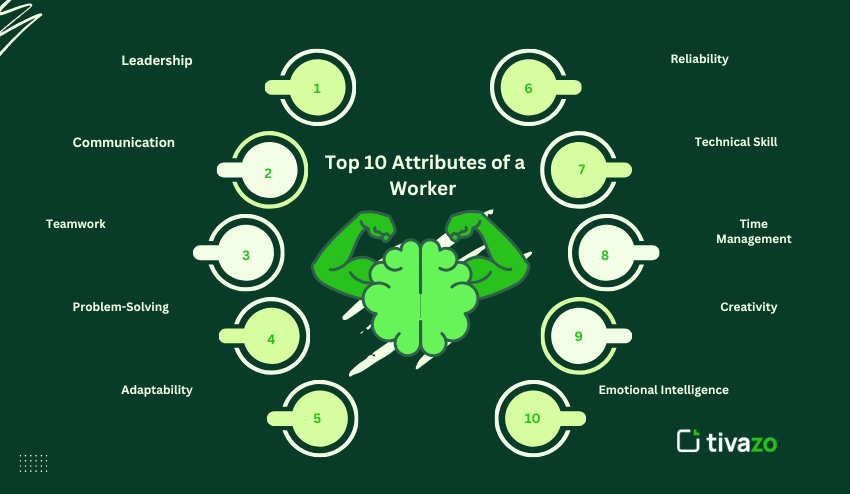
Why Knowing and Highlighting Your Work Strengths is Important
With the current competitiveness of the job market and fast-paced environments we work in, it is no longer enough to simply do your job—you need to know what your strengths are and how to articulate them. That is why knowing about your work strengths is so important. Whether you are applying for a job, looking for a promotion, or leading an effective team, identifying your most important work strengths will allow you to be recognized as an individual (the dreaded standout!), make informed career decisions, and better match your strengths and talents to business objectives.
This blog describes how to identify, articulate, and use your greatest work strengths, and includes useful examples and interviewing approaches, as well as resource material for both individuals and team managers to utilize in order to help people and teams discover their true potential.
Conclusion
Having an understanding of work strengths and knowing how to articulate them has the power to rewrite job interviews, performance reviews, leadership decisions, and team/team-based development overall. Whether you want to learn (informational intent), implement in a team or workplace (transactional intent), or if you simply want to navigate to the right examples and strategies (navigational intent) this guide has given you the visibility you needed.
Having an idea of your strengths allows you to confidently express your value clearly, raise your awareness and attention to alignment with your role, and pursue professional growth that is meaningful to you. For managers and leaders of teams, identifying the strengths of your team and using them will lead to higher morale, greater productivity, and a greater chance of long-term sustainable outcomes.
Identify your top workstories around them, and unloer, or a job seeker, it is a very powerful thing to own and take advantage of your strengths to excel.
